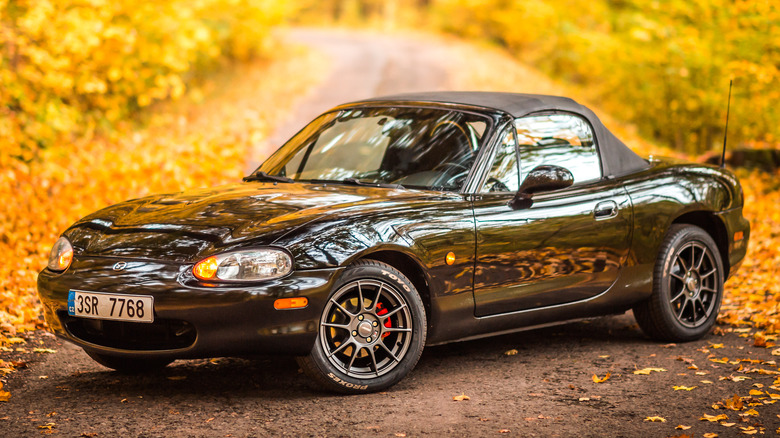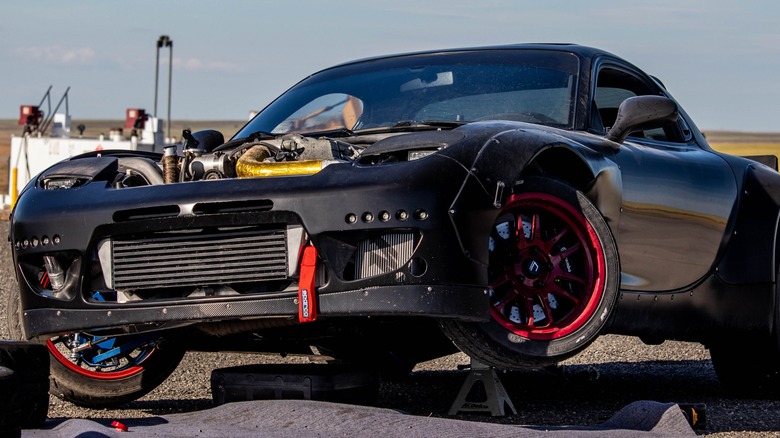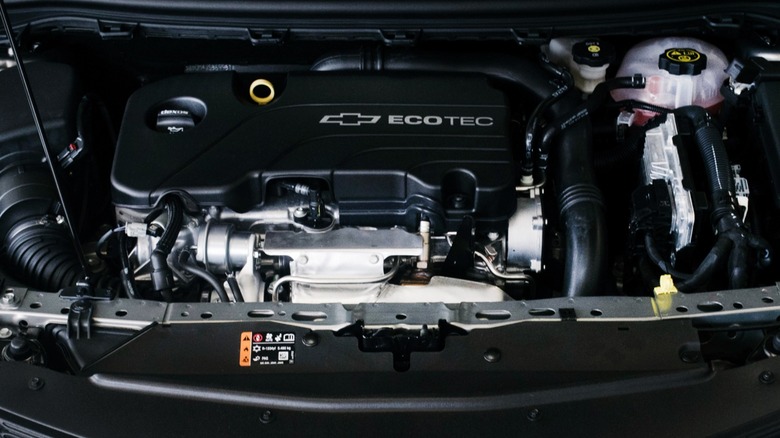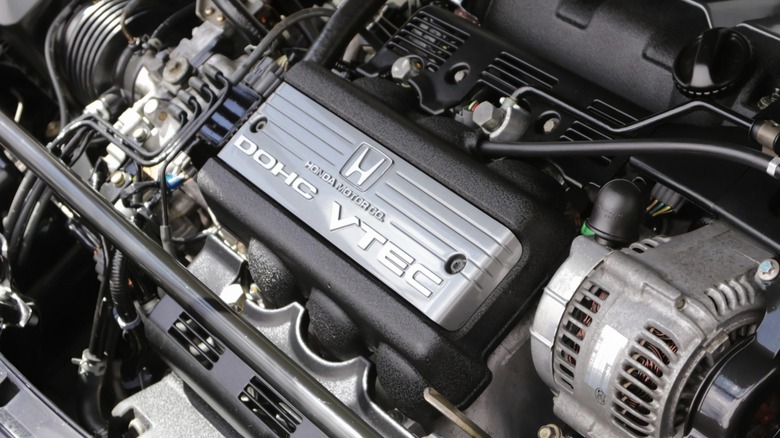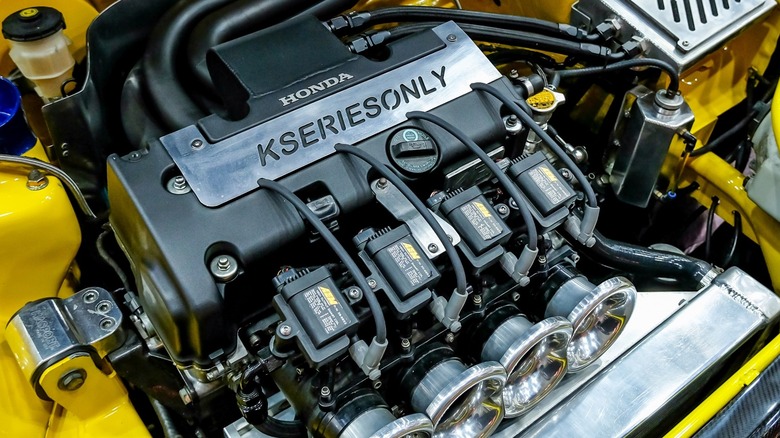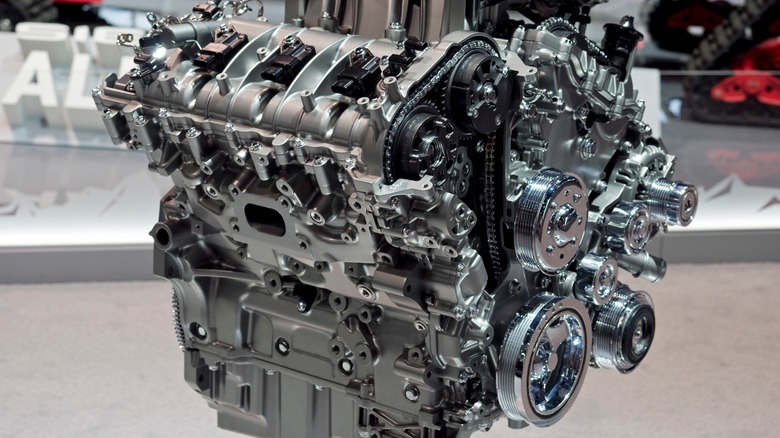5 Of The Best Engines To Put In A Mazda Miata
In this list of best Mazda Miata engine swaps, we'll examine options with DIY kits and easily sourced donor engines. As tempting as putting a Hellcat engine into a two-seater convertible sounds, it's not realistic for most folks.
The easiest Miata engine upgrade involves swapping the older 1.6-liter for a (slightly) more powerful 1.8-liter Miata powerplant. According to Top Miata, the 1.6-liter inline four-cylinder available in Miatas from 1990 to 1993 made 114 horsepower. In 1994, the new 1.8-liter made 128 horsepower. Then, in 1996, it increased to 133 horsepower. While a 17-percent horsepower gain is nothing to sneeze at, it still gains under 20 hp overall. On the bright side, the swap kit from Flyin' Miata costs under $225. For reference, the 2023 Mazda Miata's 2.0-liter makes 181 horsepower and 150 lb-ft of torque.
It's important to note that none of the following swap kits include the cost of the new engine, the profit from the sale of your old engine, or a varying amount of miscellaneous parts like coolant hoses, fluids, or new hardware.
The LS-swapped Miata option
Likely due to its popularity, DIY kits for swapping an aluminum block 5.7-liter LS V8 into a Mazda Miata are among the least expensive options. For instance, CX Racing offers a 5.7-liter LS1 swap kit for first-gen Miatas starting at around $3,000. You'll need additional driveline and accessory parts, but this kit gets your LS1 bolted into the Miata nicely.
The LS engine's longevity and popularity make it readily available in salvage yards and beater cars suitable for parting out. It's also a predictably sporty powerplant. An LS1 from a 1998 Camaro produces over 300 horsepower in its lowest form. While that's plenty of power for a Mazda Miata, other LS versions are substantially more powerful but may be too much for the stock Miata drivetrain.
eBay has several LS1s with the six-speed T56 manual transmission listings in the $7,000 to $9,000 range, but Edmunds has a few 1998 Z28 Camaros listed for under $12,000. Buying a running specimen has advantages if you have the time and space to part out a car. While this isn't the cheapest option for engine swapping a Miata, its popularity puts it at the top of our list.
Swapping a GM EcoTec into a Miata
EcoTec Miata sells its V3.1 EcoTec swap kit for about $4,000. The kit has nearly everything needed to get a 2.4-liter LE5 EcoTec engine running in your Mazda Miata.
According to GM Authority, the 2.4-liter inline-four-cylinder EcoTec engine has "direct injection, variable valve timing, and is capable of running on E85 fuel." Sporting dual overhead camshafts, the 2.4-liter EcoTec produces around 182 horsepower and 172 lb-ft of torque. Thanks to its cast aluminum cylinder heads and engine block, it provides a reliable yet lightweight platform. However, increasing its horsepower proves difficult due to the engine's relatively high 11.2:1 compression ratio.
The most tempting aspect of an EcoTec swap is the availability of complete engines for under $1,000. GM produced the 2.4-liter EcoTec from 2006 to 2019 for use in vehicles like the Verano, Malibu, Equinox, HHR, and other compact and midsize GM vehicles.
Honda J-Series Miata swap
MiniTec offers its JV6 Miata package that provides nearly everything needed to install a Honda J-Series VTEC V6 in a 1990 to 2005 Miata for around $4,000. While sourcing a Honda J35 VTEC is easy enough, look for 1999 to 2017 Honda Odyssey, 2001 to 2006 Acura MDX, 2008 to 2017 Honda Accord, and 2013 to 2018 Acura RDX models. The nearly 300 horsepower of some models could spell disaster for stock Miata drivetrain components. The J32, although more challenging to find, weighs about 25 lbs less than the larger Honda V6s, according to MotorTrend.
Like the EcoTec, J-Series Honda engines are relatively inexpensive due to the popularity of the cars they powered. The J-Series, designed and built in the United States by Honda since 1996, includes models like the 2.5-liter J25, 3.0-liter J30, 3.2-liter J32, 3.5-liter J35, and 3.7-liter J37. However, the J35 is the most common version with horsepower ratings between 210 from the J35A1 to the J35Y4's 310 hp.
A Honda K24 Miata swap
While buying a salvaged inline-four-cylinder Honda K-Series engine for a Miata swap is a popular option, that popularity results in higher prices and longer lead times for DIY swap kits. KPower lists its K24A2 "KMiata engine swap package" at about $6,000 with a lead time of 30 to 60 days. However, K24 supporters will testify that it's worth the wait and added cost.
Drifted says the best sources for a 2.4-liter K24A2 donor car in the U.S. include the 2003 through 2008 Honda Odyssey Absolute and 2004 through 2008 Acura TSX. Honda also used the K24A2 engine in 2002 through 2008 Accord Type-S models for the Japanese market.
A K24A2 from an Acura TSX ranging from 2006 to 2008 model years delivers 205 horsepower at 7,000 rpm, according to MotorTrend. The K24's stock construction is strong enough to allow forced air induction, delivering up to 500 horsepower. While you'd need to upgrade the Miata's driveline seriously to survive that much power, it's nice to know the engine can handle it.
Another GM swap option
The final Miata engine swap option we'll explore is the LFX V6 from GM. V8 Roadsters provides a DIY kit for swapping GM's LFX V6 into a Miata for about $5,000. The kit works best with a 3.6-liter V6 LFX from a 2012 to 2015 Camaro. The higher prices for the DIY kit, donor engine, and Miata upgrades to handle the estimated 328 horsepower and 278 lb-ft of torque place this swap option at the bottom of our list.
However, if the scope of doing a Miata engine swap yourself is daunting, V8 Roadsters offers a more turn-key option. For about $8,500, they'll install your LFX V6, transmission, and differential into your Miata. You'll still have to do some work and sourcing for things like power steering, coolant hoses, and exhaust, but the most challenging aspects of the project are completed for you.
There are other kit brands and engines you could also use, but these are among the most readily available and complete kits for DIY mechanics.
